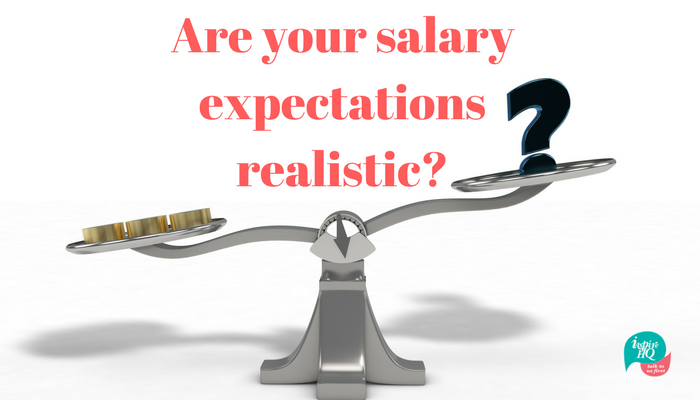If you’ve applied for a job and been for an interview you’ll no doubt have had to contend with the “what are your salary expectations” question. You’ve probably wanted to ask what the salary is from the moment you considered applying for the job but everyone knows asking the salary question straight up is perceived as poor etiquette.
Salary is a tricky one. The job sounds great, you’re really keen but is salary going to rule you in or out? When it comes to salary, in my experience, most people come up with their expected salary range by looking at their current salary and determining if they are comfortable with what they are earning or how much more they want to bump it up by. Sadly it doesn’t work that way which is where I think some people tend to come unstuck. This kind of approach to setting your salary expectations is potentially going to lead to rejection after rejection. When determining your salary expectations, and this is something you should probably have a good think about before you even start applying for jobs, so many more factors need to come into consideration; it’s not just about what you are earning now and how more would be nice to earn.
If you are going to solely use your current role as a basis for determining you salary expectations for your next role you need to make sure you are comparing apples with apples. Now this comes down to considering a lot more than simply the job title.
When determining your salary expectations there are a few things you want to be taking in to consideration in addition to simply comparing it to your current job:
- Level of responsibility and accountability, decision making authority and need to exercise judgement and initiative. For example an Admin Officer in one business might have no direct reports, limited decision making authority and may be required to perform a very structured list of tasks day in and day out. In another business, an Admin Officer may have 5 direct reports, may exercise judgment regularly, may have full accountability for their area of the business and be expected to go over and above to get the job done. Honing in on the details of role is more important than going by job title. The level of responsibility will have a significant impact of salary.
- Market rates, EBA’s and Award rates. Salaries vary significantly between organisations depending on how they determine their salary structure. There are some employers that pay well above other employers and if you have been working in an environment that does pay above market rates it can be a shock when you start your job search. I see it all the time. A job seeker has worked for an employer who has some pretty generous salary provisions; the employer pays under an EBA, the salary bands are generous compared to award and market rates, there are additional benefits like increased superannuation. Then they decide to start looking for a job and are shocked to find that other businesses who are paying market rates or award rates are paying well below the salary they have been accustomed to. This is when you need to consider what’s important to you; are you looking to change jobs for the money or is something else motivating the change. Depending on the motivation, it will impact the way you approach your job search and the employers that you apply to.
- Permanent vs Casual vs Fixed Term. This is one I am seeing crop up more often because of the increase in the casualisation of the workforce in certain sectors. If you are working in a casual position your hourly rate will have a casual loading which is in lieu of receiving paid annual leave and personal leave. I see many people struggle with transferring back from casual pay rates to permanent rates as all they focus on is the decrease in the actual hourly pay rate. We all get used to a particular lifestyle and to take a cut in your hourly rate can put a lot of pressure on some people but what you need to remember is that moving from a casual rate to a permanent rate is not actually a pay cut. This one is really horses for courses. Some people want the security of a permanent position, others are not fazed by being casual. Again it depends on what’s important to you.
If you are starting to look at changing jobs, doing your salary research and comparisons early on in the job search process will end up saving you a lot of time and effort. Knowing how what you currently earn compares in the market and benchmarking your current job against jobs that you are interested in will ensure that you don’t end up wasting time applying for jobs that you’ll only end up withdrawing from or being ruled out of consideration for because of the dollars. A targeted approach and knowing what you want and what’s important to you will get you a better outcome. After all, it not always just about the money.


